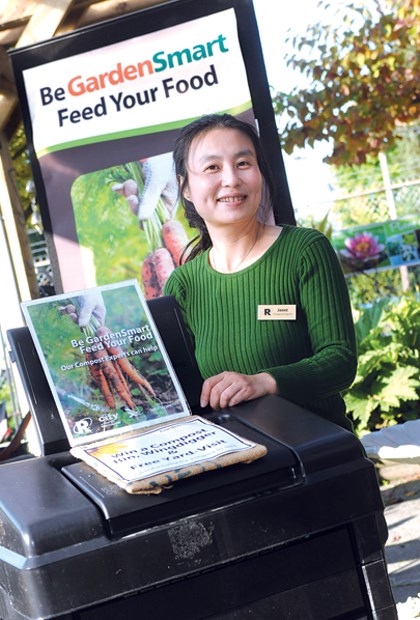You would think in this day and age that everyone recycles, but I guess the message has not gotten out to everyone yet.
As an avid gardener I have two compost bins, a regular-sized bin for kitchen scraps and a larger box for garden clippings, sticks, dead plants, trimmings and the like. Ninety-seven per cent of my kitchen scraps go into the kitchen bin. I don't put in fish parts, leftover cooked food except rice and noodles, or any other food product that is really smelly or attractive to rodents. All waste from my garden goes into the garden box except noxious weeds that are pernicious like morning glory or horsetail. Anything that is recyclable goes into the recycling bins/bags. My "garbage" goes to the curb once every two or three weeks, sometimes only once a month because I generate very little actual "garbage." Yes it took some time and effort to train my children how to have a green conscience and handle household waste, but if you start training them when they are young it is much easier to teach them versus starting later when they are teenagers.
Every person in the world should care about what goes into their garbage because managing garbage costs money - and lots of it - and taxpayers pay the bill. Not to mention the fact that "managing garbage" has environmental consequences, even though those consequences are hidden from our daily lives. That is until we hear about another waste incinerator being built or some landfill leaking toxic leachate into groundwater, or worse yet, the landfill fills up and new dumping ground is needed. There is also the ongoing problem of what to do with the existing landfills that leak methane and other toxic gases into the atmosphere. Old landfills are found all over our region, many of them have golf courses or parks covering up their sin. There are even some old smallscale landfills hiding on the North Shore that are still being used by parties that shall remain unnamed ... for now.
In 2011 Metro Vancouver undertook a Solid Waste Composition Monitoring study to determine the various components of our region's garbage. Aside from the usual things you might expect to find in the garbage, by far the largest component of our garbage was compostable organics. The study found that in the Industrial, Commercial & Institutional sectors which include loads from city facilities, offices, schools, and hospitals, 34 per cent of the garbage was compostable organics. In the Multi-Family Residential segment of the study which includes apartments, condos and townhouses, 39 per cent of the waste was comprised of compostable organics.
In the Single Family Residential segment of the study, 45 per cent of the garbage from curbside pickup was comprised of compostable organics. Those are some pretty high numbers for a region that regularly congratulates itself on being green and sustainable.
So what can everyone do to help reduce, reuse and recycle? Start by thinking about what you throw in the garbage. If any item can be recycled, composted or reused then it should be directed appropriately and not thrown into our expensive and environmentally damaging garbage system. Everyone should compost at home, and that includes people living in multi-family residential complexes. Yes it takes some work for apartment dwellers to compost but there are simple solutions that can be implemented such as in-suite green bins, locating communal green bins on the property and even building community gardens to help use some of the green-waste. And I know what all you property management companies are thinking; no way, compost smells, it causes rodent problems and we don't have the room. Too bad, it's not 1960 anymore, this is the way of the future so join the green revolution willingly or get dragged kicking and screaming by whatever form future legislation takes.
When it comes to composting at home in single family residential properties, it's as easy as setting up a bin, learning a few facts about home composting and doing your part to help reduce the large amount of compostable organics that end up in the garbage can. The North Shore Recycling Program has great information on how to compost at home. During October the North Shore Recycling Program's GardenSmart compost experts will be on hand in various garden centres to answer questions and help solve some of the common problems sometimes associated with compost. In addition GardenSmart compost experts are available for free yard visits for residents of North and West Vancouver. The visits typically take less than an hour and provide answers to site-specific questions. For more information on compost dates, times, and locations, to book an appointment or to buy a subsidized compost bin, visit northshorerecycling.ca.
Todd Major is a journeyman horticulturist, garden designer and builder, teacher, skills trainer and organic advocate. For advice, contact him at [email protected].



